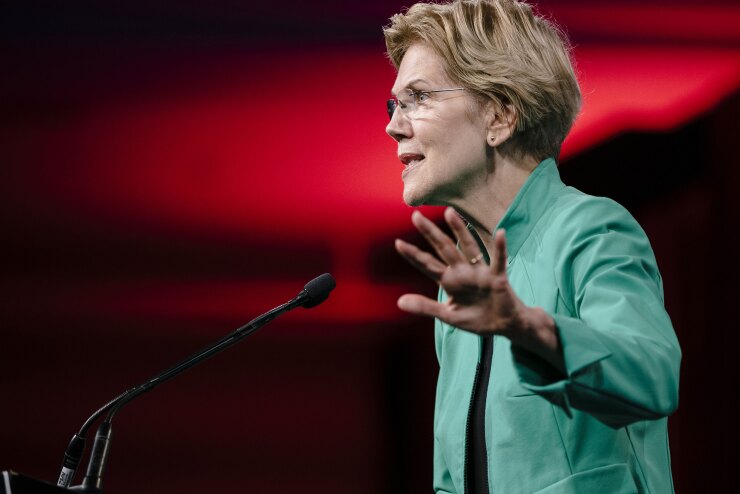Receiving Wide Coverage ...
Out with the old …
“As many as a dozen” partners at Goldman Sachs “are negotiating their exits from the firm and likely to depart by year’s end. In all, up to 15% of Goldman’s partners may leave this year, far higher than typical turnover.” They would follow Martin Chavez, co-head of the bank’s trading division, who announced his retirement on Tuesday. Meanwhile, “fewer are rising to take their place: Goldman last year named 69 new partners, its smallest partner class in two decades,” the Wall Street Journal reports.
CEO David Solomon “in some cases is deliberately culling a partnership he sees as bloated.” The bank “must also clear out space for leaders in the new consumer businesses Goldman is building. The founder of a personal-finance app Goldman bought this year joined as a partner, as did the CEO of a wealth-management firm it acquired.”
Meanwhile, rival UBS “is preparing an overhaul of its investment bank as the Swiss lender seeks to galvanize earnings and cut costs after a drop off in performance over the past few quarters. As part of the revamp, due to be announced at a town hall on Thursday, executives are discussing hundreds of job cuts at the investment bank, especially within the higher ranks, as duplicate roles are cut after sweeping divisional mergers,” the Financial Times reports.
“Along with much of the industry, UBS’ investment bank has gone through a rough patch of late amid geopolitical tensions, low client activity levels and regulatory changes.”
Indeed, revenue at the 12 biggest American and European investment banks “plunged to a 13-year low in the first half of 2019 as geopolitical tensions, slowing growth and low interest rates compounded a structural decline that set in after the financial crisis.” The 12 banks generated a combined $76.8 billion in revenue from trading and advisory operations in the first half, down 11% from the year earlier period and the slowest first half since 2006.
We’re listening
Christine Lagarde, the presumptive next president of the European Central Bank, “held out an olive branch to the bank’s German critics at a confirmation hearing on Wednesday, promising to review the costs and benefits of controversial ECB policy tools such as negative interest rates and large-scale bond purchases, even as she signaled she would leave them in place.” Lagarde, who is expected to replace Mario Draghi on November 1, said that while the ECB’s policies on Europe’s economy “continue to be positive, we need to be mindful about their potential side effects, and we have to take the concerns of people seriously.”
One of those critics is Deutsche Bank CEO Christian Sewing, who said another rate cut by the ECB next week not only “would do little to stimulate the economy but would deepen divisions in society.” Driving rates further below zero “may make refinancing cheaper for governments but it will have serious side-effects,” such as causing a “split in society” between those who can access cheap loans while penalizing German savers.
Wall Street Journal
Mulling the buffer
Federal Reserve Vice Chairman for Supervision Randal Quarles plans to propose Thursday integrating the “countercyclical capital buffer into pending revisions to the annual stress testing exercises faced by the nation’s largest banks.” The buffer, which has never been turned on before, “allows the Fed to require banks to hold more loss-absorbing capital should the economy show signs of overheating or to keep less of it during bad economic times. The proposed changes are part of a broader effort by the Fed and other banking regulators to simplify the financial rulebook implemented after the 2008 financial crisis.”
Financial Times
House cleaning
Danske Bank has hired Stephan Engels, Commerzbank’s CEO, to do the same job at Denmark’s largest bank as it “seeks to restore trust” following last year’s mammoth money laundering scandal. He is expected to join the bank next April. “Jacob Aarup-Andersen, who was set to be appointed as Danske’s new chief executive by the board but was rejected by Danish regulators,” will serve as acting CFO in the interim.
New York Times
We’re working on it
Wells Fargo CEO C. Allen Parker told Sen. Elizabeth Warren that the bank has begun an “extensive review” of how it “it closes customers' accounts and the fees it charges some customers even after their accounts are supposedly closed.”
Parker wrote a letter to Massachusetts Democrat on the same day the senator urged the Comptroller of the Currency and the Securities and Exchange Commission to look into the bank’s practices.
She asked SEC Chairman Jay Clayton “to investigate whether Wells Fargo had misled investors by reporting any fees collected on the closed accounts as revenue.”
The paper reported last month that the bank “charged customers hundreds or even thousands of dollars in overdraft fees in the weeks after Wells Fargo informed them that it was closing their accounts. The bank ignored complaints that at least two employees raised about the practice.”
Quotable
“Few economists, at least, believe that cheaper money on this level will do anything.” — Deutsche Bank CEO Christian Sewing, arguing against further cuts in European interest rates that are already below zero






